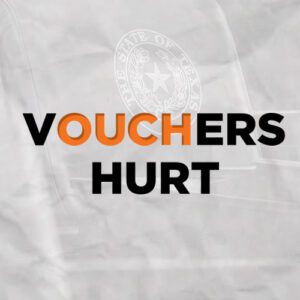School Vouchers 101
What are School Vouchers?
School vouchers are taxpayer-funded subsidies given to private schools and vendors without transparency and accountability for results.
Over the years, supporters of such policies, including well-funded, out-of-state special interest groups, have worked to siphon public dollars away from public schools, claiming they provide choice and empowerment for Texas families.
But a growing body of credible research about school vouchers finds voucher programs often fail to serve students from disadvantaged or marginalized backgrounds, and the impact of vouchers on student achievement is either insignificant or mixed.
Raise Your Hand Texas opposes any policy that would divert state money for public education from our public schools.

THE THREAT OF THE EDUCATION SAVINGS ACCOUNT (ESA) VOUCHERS
ESAs allow parents to hold public funds in an account to be used for private school tuition, homeschooling, private tutors, online courses, and purchases from an array of private vendors.
Though marketed as distinct from traditional school vouchers, an ESA is simply a different way to redirect public taxpayer dollars to pay for private, unregulated, and unaccountable services.
Because ESAs are often unregulated and not accountable for results, they present a real danger for fraud and misuse of taxpayer funds. In other states, as ESAs are adopted and new money flows, “microschools” and other fly-by-night educational centers are popping up in shopping centers and other temporary locations to offer services in return for ESA funds. Without strict regulations, regular audits, and transparent reporting of student academic results, ESAs can misuse public funds and harm students and their potential for learning and achievement.
Additionally, ESAs can produce a “windfall” effect when parents who can already afford private schools use ESAs to supplement tuition and receive a refund of sorts. There is also the real possibility that “entrepreneurs will set up shop in wealthy areas where parents can ‘top up’ the ESA dollars while ignoring communities with a greater need for good education options.”
Sources: Why I’m Wary of Universal Savings Accounts. Thomas B. Fordham Institute. February 16, 2023; Six Big Problems with Education Savings Accounts. Forbes. February 1, 2021
VOUCHERS AND THE 88TH LEGISLATIVE SESSION
The Texas Legislature considered several voucher proposals during the 88th Legislative Session, but legislation did not pass. In September 2023, Governor Abbott promised a public education special session would take place in October 2023, and threatened political consequences for lawmakers, saying, “There’s an easy way to get it done, and there’s a hard way…in a special session or after an election.”
Headlines and reports abound regarding the potential hazards for Texas families, schools, and communities if vouchers are adopted in Texas. Rural Texas in particular could suffer if funding is removed from public schools, the lifeblood of many small communities, as well as a major employer in many areas.
And even though many small towns do not currently have private schools to accept voucher funds, other states have demonstrated that loosely-regulated Education Savings Account (ESA) vouchers promote the creation of new pop-up schools and vendors who are willing to accept voucher funds, but are not willing to provide transparency or accountability for student learning (see more below re: ESAs).
Instead of diverting funds from our public schools that serve all Texas students, regardless of zip code, ability, disability, or identity, the 88th Legislature should focus on investing in public schools and strengthening the teaching profession, so current and future generations of Texans will continue to have high-quality educational choices in our neighborhood public schools.
Types of School Vouchers
Whether it’s calling them “grants,” “tax credits,” “scholarships,” “debit cards,” or “savings accounts,” voucher supporters have tried many tactics to divert taxpayer dollars from public education and students. The vendors and private schools who would benefit from voucher programs do not have to comply with the same rules and standards that ensure accountability, transparency, and access for all students. Any use of state funds for private educational purposes is a voucher.

Traditional Vouchers
Strip money from public schools in the form of grants parents can use for their children to attend private schools.

Education Savings Accounts
The state creates a taxpayer-funded account parents can use for private school enrollment and other educational services.

Tax Credit Scholarships
With this type of voucher, the state funnels tax credits to corporations or individuals who have donated to scholarship organizations that would pay for students to attend private schools.

Virtual or Special Education Grants
Often targeted at certain populations of students, including students with disabilities or who want to attend school remotely through a private vendor, these vouchers divert funds from our public schools to private vendors in an effort to create a statewide network of publicly funded private virtual schools.
